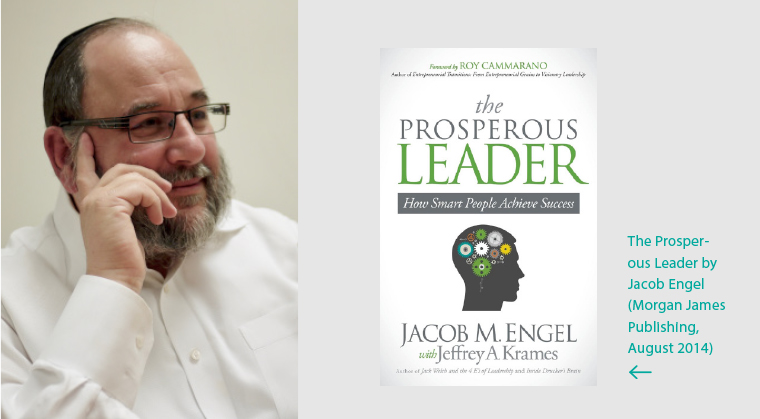Becoming An Entrepreneur
| July 17, 2019“What good is it having a belly if there’s no fire in it? Wake up, drink your passion, light a match, and get to work,”

W
hat Does It Really Take To Become An Entrepreneur?
When I was writing my book, The Prosperous Leader, which focuses on how to take charge and grow your business, I had an amazing encounter with a famous author, Michael E. Gerber, who wrote The E-Myth: Why Most Small Businesses Don’t Work and What to Do About It. During our conversation, we talked about my father, a Holocaust survivor, who built his own business called Gel Spice Company in 1955, after having gone through the war and being left without money, connections, or even knowing the language. He grew that business from a small storefront in Brooklyn to a huge facility in New Jersey with multiple warehouses and eventually earned millions.
Gerber encouraged me to write about what I had seen in him firsthand — how a determined entrepreneur can start a business from the ground up, and what really goes into making it succeed. That became the background for The Prosperous Leader. Now I have a business of my own called Yeda LLC. In addition to “Yeda” meaning knowledge in Hebrew, it’s also the acronym for my father’s Hebrew name — Yissochar Dov Engel. Stated simply, my goal is to help business owners succeed. I evaluate their strengths and abilities, and provide leadership coaching, mentoring, and training. Today, people look at the entrepreneurial world as glamorous. They assume that being your own boss is the dream and, once achieved, everything will be smooth sailing.
But it’s certainly not that easy. So should you take the leap into business ownership? Before you do, make sure the following ideas and practices are in the forefront of your mind and ready to be put into place.
1. PERSONAL GROWTH
In his bestselling book, The 7 Habits of Highly Effective People, Dr. Stephen Covey points out that many people live their lives by what he calls an “outside in” versus “inside out” mentality. This means that we try to appear successful on the outside without giving much attention to what’s going on internally.
We often finger-point and blame others, such as employees, schools, and even society. While all of those factors can, of course, contribute toward our stress, we often can’t change them. The only thing we truly can change is what’s going on inside ourselves and our businesses. Often when you start your own business, you are everything. Since you don’t have other employees, there’s no one else to blame for any mistakes.
Therefore, you can be reflective and willing to actively work to change what’s not functioning well. Later on, once you do have your own employees, you need to constantly be focused on your actions, as a way of teaching your employees through example. For example, if you want your employees to be more communicative, make sure your communication style is conducive to motivating your team. Be a great listener, and your team will follow in your footsteps.
2. EFFECTIVE LEADERSHIP
Peter Drucker, a well-known management consultant who is also renowned as the grandfather of modern-day leadership, explained the difference between being effective and being efficient: “Efficiency is doing things right; effectiveness is doing the right things.” Referring back to our first point, this means that entrepreneurs can’t just be focused on perfection in their own worlds, they also need to pay attention to how their vision is influencing others. Good leaders need to be open, honest, and want to build the leaders around them.
My mentor Roy Cammarano, author of Entrepreneurial Transitions: From Entrepreneurial Genius to Visionary Leader, studied why some entrepreneurs can build their organizations very successfully while others hit plateaus and then crash. He discusses three levels of entrepreneurship, the most effective being “visionary leadership,” which involves leading with good communication. Communication can be explained further by subdividing into six Cs. The first C’s are conflict and competition, which Roy says contribute to a predictable failure. Do you and your team talk openly, or is it about blaming others and not working together? In his experience, these companies will naturally have a greater chance of failure. The second Cs are compliance and communication, which are essential ingredients of success. Create clear rules and regulations about what employees may do and which decisions are in their power to make. Have weekly meetings in which everyone is updated as to what is happening in the company, so that everyone feels involved and work isn’t wasted.
I’ve been to companies where team members aren’t being updated on the others’ activities, and are therefore duplicating projects, or tasks are falling through the cracks — simply because of a lack of proper communication. The final two Cs are collaboration and cooperation, which will ideally take you to the next step, prosperity. Do your employees believe that you want them to be successful? Do you encourage them to collaborate with each other or do they have to ask you about every little detail? Is the business culture such that people are rewarded for cooperating for the benefit of the clients? Putting all of these components in place will help you achieve a healthy, positive work environment — which, in turn, will undoubtedly be obvious in the product or service itself.
3. WANTING TO MAKE A DIFFERENCE
Simon Sinek, in his book Start with Why, explains that the best entrepreneurs are the ones that don’t just get up and do, but those who know why they are doing it. “What good is it having a belly if there’s no fire in it? Wake up, drink your passion, light a match, and get to work,” he says. He explains that every company knows what they do, and most know how they do it, but very few know why they do it. I asked that question myself when starting my business, and by feeling empowered to help others succeed, I continue to work hard every day to make it happen. As Simon Sinek says, people don’t do business with you because of what you do, but rather because of why you do it.
RECOMMENDED READING LIST
Another common denominator between great entrepreneurs are that they actively pursue new and better methods of doing business. When you don’t know something, instead of getting frustrated, you can learn how to be better at it. When you’re an entrepreneur, you constantly need to be learning. For almost any issue you’re facing, there will be a book about it. Here is my recommended reading list for every entrepreneur.
Man’s Search for Meaning by Viktor Frankl
The 7 Habits of Highly Effective People by Stephen Covey
Authentic Happiness by Martin Seligman
Mindset by Carol Dweck
The Effective Executive by Peter Drucker
Please Understand Me by David Keirsey
Six Thinking Hats by Edward De Bono
How to Win Friends and Infl uence People by Dale Carnegie
Driven by Distraction by Edward Hallowell
The Resilience Factor by Andre Shatte
Starting with Why by Simon Sinek
The E-Myth by Michael Gerber
Entrepreneurial Transitions by Roy Cammarano
Jacob M. Engel is the founder and CEO of Yeda LLC. He is the author of The Prosperous Leader: How Smart People Achieve Success (www.theprosperousleader. com). He can be reached at 845-357-5000 or by e-mail at jme@yedallc.com (www.yedallc.com).
(Originally featured in 2.0, Issue 4)
Oops! We could not locate your form.













